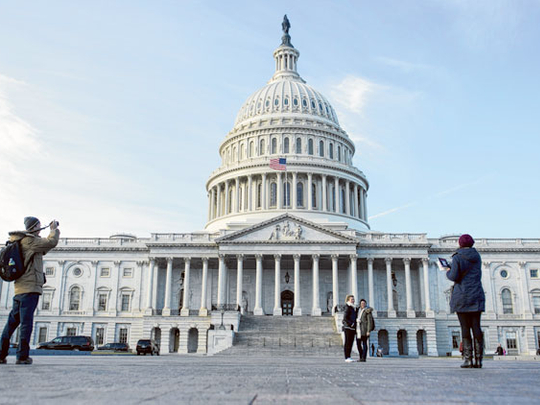
Washington: Democrats drove Wednesday toward extending their control of the House for two more years, but their expectations of expanding their majority seemed tenuous as they lost three incumbents and failed to oust any Republican lawmakers in initial returns.
Democrats as expected picked up a pair of North Carolina seats vacated by GOP incumbents after a court-ordered remapping made the districts more Democratic. But even as they seemed likely to retain House control, the voting’s results were developing into an unexpectedly disappointing election for the party.
The parties swapped a handful of seats apiece, underscoring what seemed to be largely a status-quo House election.
15-term Peterson defeated
After decades of trying, Republicans finally defeated 15-term Rep. Collin Peterson from a rural Minnesota district that backed President Donald Trump in 2016 by 31 percentage points, Trump’s biggest margin in any Democratic-held district. Peterson, who chairs the House Agriculture Committee, opposed Trump’s impeachment and is one of the House’s most conservative Democrats. He was defeated by Republican Michelle Fischbach, the former lieutenant governor.
Freshmen Democrats Debbie Mucarsel-Powell and Donna Shalala also lost, falling in adjacent South Florida districts in a state where Trump seemed to consolidate his support among Cuban voters.
Should Democrats retain the House majority as seemed likely, it would mark only the second time in a quarter century that they’ve controlled the chamber for two consecutive two-year Congresses. The first period ran from 2007 through 2010, Nancy Pelosi’s initial run as speaker.
Democrats’ hopes of protecting their majority and even expanding it were based on public anxiety over the pandemic, Trump’s alienation of suburban voters and a vast fundraising edge. But those advantages didn’t carry them as far as Democrats hoped.
Before votes were counted, both parties’ operatives agreed that the GOP was mostly playing defence and would be fortunate to limit Democratic gains to a modest single digits. Democrats control the House 232-197, with five open seats and one independent. It takes 218 seats to control the chamber.
Coin-flip races
Earlier Tuesday, House Speaker Nancy Pelosi told reporters she was ``absolutely certain’’ that Democrats would ``solidly hold the House.’’ Illinois Democratic Rep. Cheri Bustos, who chairs the House Democratic campaign organization, predicted wins in deeply red districts.
With GOP expectations for capturing the House all but nonexistent entering Election Day, Republicans were likely to view the day’s results as acceptable.
Democrats lost a series of what were viewed as coin-flip races, failing to defeat GOP incumbents in Cincinnati, rural Illinois, central Virginia and the suburbs of St. Louis.
In an example of Democrats’ disappointing showing, they failed to win an open district outside Houston where minorities have become a majority of residents. The winner, GOP Fort Bend County Sheriff Troy Nehls, had said a local mandatory mask order ``looks more like a communist dictatorship than a free republic.” That race cost the two sides over $32 million, making it one of the country’s most expensive, according to the nonpartisan Centre for Responsive Politics.
As if symbolically, Bustos, who leads the Democratic Congressional Campaign Committee, was in her own tight race. She represents a closely divided Illinois district that she won by 24 percentage points in 2018.
While some endangered Democrats like New Jersey’s Tom Malinowski held on, the party notched no initial victories in long-shot races that they’d hope would bolster their majority. Republicans retained such districts in central North Carolina and around Little Rock, Arkansas.
As Wednesday morning progressed, other hotly fought races remained undecided in states including Georgia, Texas and Virginia.
Easily elected
Scores of both parties’ incumbents from safe districts were easily reelected. These included progressive star Democratic Rep. Alexandria Ocasio-Cortez in New York City and both parties’ No. 3 House leaders, Democrat James Clyburn of South Carolina and Republican Liz Cheney of Wyoming.
Also coming to Washington will be New York City area Democrats Jamaal Bowman, a progressive who was backed by Ocasio-Cortez, and Ritchie Torres, who will be Congress’ first openly gay Hispanic.
Mucarsel-Powell lost to Miami-Dade County Mayor Carlos Gimenez. Mucarsel-Powell and Shalala both represent districts that Trump lost badly in his 2016 presidential race. Shalala, at 79 the House’s oldest freshman, lost to Republican Maria Salazar, a former TV news anchor.
In one noteworthy but unsurprising result, Marjorie Taylor Greene, who has espoused unfounded QAnon conspiracy theories, won a vacant seat in northwest Georgia. Trump has called Greene a ``future Republican star.’’ QAnon asserts that Trump is quietly waging a battle against pedophiles in government.
Hanging over the contests were the coronavirus pandemic and the wounded economy, which voters ranked as top concerns, according to AP VoteCast, a national survey of the electorate. The virus has killed 232,000 people in the US and cases are rising in nearly every state, while millions have lost jobs.
Buoying Democrats was a coast-to-coast edge in campaign fundraising, including for all 29 Democrats from districts Trump won in 2016 and Republicans were targeting. By early Wednesday, Minnesota’s Peterson was the only one of those Democrats who’d lost.
Nearly all Democratic incumbents in potentially vulnerable districts were outspending their GOP challengers, often by vast margins, according to an AP analysis of Federal Election Commission campaign reports.
Pelosi was hoping to use control of the chamber to pass party priorities that include expanding health care coverage and creating jobs with new infrastructure projects.
Democratic ads
As in 2018 when they grabbed House control, Democratic ads emphasized pledges to make health care more accessible, preserve coverage for pre-existing conditions and shield voters from Republicans out to terminate those requirements. Many Republicans say they want to dismantle Obama’s health care law while retaining its coverage for pre-existing conditions, but they’ve not presented a detailed proposal for doing that.
The pandemic has only amplified Democrats’ focus on health care. Trump’s repeated false statements downplaying the virus’ severity have also given Democrats political fodder.
This year’s House elections were projected to cost a record $7.3 billion in spending by candidates’ campaigns and outside groups, according to an estimate by the Center for Responsive Politics. By mid-October, candidates’ campaigns alone had reported raising $1.7 billion, another record.
AP VoteCast is a nationwide survey of more than 127,000 voters and nonvoters conducted for The Associated Press by NORC at the University of Chicago.








